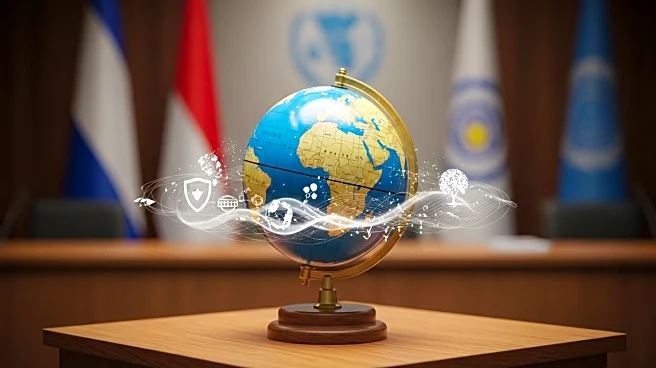What's Happening?
Prime Minister Shehbaz Sharif of Pakistan addressed the 80th session of the United Nations General Assembly, focusing on security, climate change, and regional tensions. He recounted a recent confrontation with India, where Pakistan's military reportedly downed seven Indian fighter jets following airstrikes. Sharif praised the military's response and thanked President Trump for mediating a ceasefire. He also highlighted Pakistan's role in counterterrorism, warning of foreign-funded groups operating from Afghanistan. On climate issues, Sharif emphasized Pakistan's vulnerability to climate-induced disasters despite its minimal contribution to global emissions. He reaffirmed Pakistan's willingness to engage in dialogue with India, particularly concerning the Indus Waters Treaty and Kashmir.
Why It's Important?
The Prime Minister's address underscores Pakistan's strategic position in South Asia, highlighting its military capabilities and diplomatic engagements. The emphasis on counterterrorism reflects ongoing security concerns that have implications for regional stability and international relations. Climate change discussions are crucial as Pakistan faces severe environmental challenges, impacting its economy and population. The dialogue with India over water rights and Kashmir remains a critical issue, affecting bilateral relations and regional peace. The speech also touches on broader geopolitical dynamics, including Pakistan's alliances and its stance on Middle Eastern conflicts, which could influence international diplomatic efforts.
What's Next?
Pakistan's willingness to engage in dialogue with India suggests potential diplomatic negotiations, particularly concerning the Indus Waters Treaty and Kashmir. The international community may respond to Sharif's call for climate justice, potentially leading to increased support or funding for climate resilience initiatives in Pakistan. The focus on counterterrorism and regional security could prompt further discussions with Afghanistan and neighboring countries to address cross-border threats. Additionally, Pakistan's stance on Middle Eastern conflicts may influence its diplomatic relations with countries involved in these issues.
Beyond the Headlines
The Prime Minister's speech highlights ethical and legal dimensions, such as the need for fair climate policies and the protection of human rights in conflict zones. The emphasis on Islamophobia and hate-driven ideologies points to cultural and societal challenges that require international cooperation. Long-term shifts may include strengthened diplomatic ties with allies and increased focus on sustainable development to address climate vulnerabilities.









